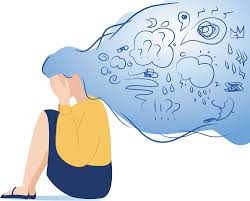Navigating Life with Anxiety: Strategies for Coping and Thriving
by twib

Understanding Anxiety: A Common Struggle
Anxiety is a normal human emotion that everyone experiences from time to time. It’s that feeling of fear, worry, or unease about something with an uncertain outcome. While occasional anxiety can be a natural response to stress, persistent and excessive anxiety can become a serious mental health issue.
There are different types of anxiety disorders, including generalized anxiety disorder (GAD), panic disorder, social anxiety disorder, and specific phobias. Each type manifests in its unique way, but they all share common symptoms such as restlessness, irritability, difficulty concentrating, and physical symptoms like rapid heartbeat and sweating.
Living with anxiety can be challenging. It can affect various aspects of a person’s life, from relationships to work performance. Many individuals with anxiety may feel isolated or misunderstood because the invisible nature of the condition makes it hard for others to grasp the extent of their struggles.
Fortunately, there are effective treatments available for managing anxiety. These may include therapy (such as cognitive-behavioral therapy), medication, lifestyle changes (like regular exercise and stress management techniques), and support groups. Seeking help from mental health professionals is crucial for developing coping strategies and finding relief.
It’s essential to remember that it’s okay to seek help for anxiety. Mental health is just as important as physical health, and reaching out for support is a sign of strength, not weakness. By raising awareness about anxiety and breaking the stigma surrounding mental health issues, we can create a more understanding and supportive community for those struggling with this common yet often misunderstood condition.
Understanding Anxiety: Symptoms, Causes, and Support Strategies
- What are the symptoms of anxiety?
- How is anxiety different from stress?
- What causes anxiety disorders?
- Can anxiety be treated without medication?
- How can I help someone with anxiety?
What are the symptoms of anxiety?
Anxiety can manifest itself in various ways, and its symptoms can vary from person to person. Common symptoms of anxiety include feelings of nervousness, restlessness, or tension, along with a sense of impending danger or panic. Physical symptoms may include increased heart rate, sweating, trembling, and difficulty breathing. Individuals with anxiety may also experience trouble concentrating, irritability, muscle tension, and sleep disturbances. It’s important to recognize these signs early on and seek professional help if these symptoms persist or interfere with daily life.
How is anxiety different from stress?
Anxiety and stress are often used interchangeably, but they are distinct experiences. While stress is a response to a specific external pressure or demand, anxiety is a more generalized feeling of fear or apprehension about the future. Stress is usually temporary and linked to a particular situation, while anxiety tends to linger and may not have a clear trigger. Additionally, stress can sometimes be a motivating factor, pushing individuals to take action, whereas anxiety can be paralyzing and overwhelming. Understanding the differences between anxiety and stress can help individuals better recognize and manage their emotions for improved mental well-being.
What causes anxiety disorders?
Anxiety disorders can stem from a combination of factors, including genetics, brain chemistry, personality, and life experiences. While some individuals may have a genetic predisposition to anxiety disorders, environmental stressors and traumatic events can also trigger or exacerbate these conditions. Imbalances in neurotransmitters in the brain, particularly serotonin and dopamine, are believed to play a role in the development of anxiety disorders. Additionally, certain personality traits, such as perfectionism or a tendency towards negative thinking patterns, can contribute to the onset of anxiety. Understanding the complex interplay of these factors is crucial in addressing the root causes of anxiety disorders and tailoring effective treatment approaches for individuals experiencing these challenges.
Can anxiety be treated without medication?
Anxiety can indeed be treated without medication through various non-pharmacological approaches. Therapeutic interventions such as cognitive-behavioral therapy (CBT), mindfulness practices, relaxation techniques, and lifestyle modifications have shown to be effective in managing anxiety symptoms. CBT, in particular, helps individuals identify and challenge negative thought patterns that contribute to anxiety, leading to long-lasting changes in behavior and emotional responses. Engaging in regular physical exercise, maintaining a healthy diet, getting enough sleep, and practicing stress-reduction methods like deep breathing or meditation can also play a significant role in alleviating anxiety. Seeking support from mental health professionals or joining support groups can provide additional tools and strategies for coping with anxiety without relying on medication.
How can I help someone with anxiety?
Supporting someone with anxiety requires empathy, patience, and understanding. One of the most important ways to help is by listening actively and validating their feelings without judgment. Encouraging open communication and offering reassurance can also make a significant difference. It’s essential to educate yourself about anxiety to gain insight into what your loved one is experiencing. Encouraging them to seek professional help and supporting them in their treatment journey is crucial. Remember that small gestures of kindness, such as checking in regularly or engaging in calming activities together, can go a long way in showing your support and care for someone dealing with anxiety.
Understanding Anxiety: A Common Struggle Understanding Anxiety: A Common Struggle Anxiety is a normal human emotion that everyone experiences from time to time. It’s that feeling of fear, worry, or unease about something with an uncertain outcome. While occasional anxiety can be a natural response to stress, persistent and excessive anxiety can become a serious…
